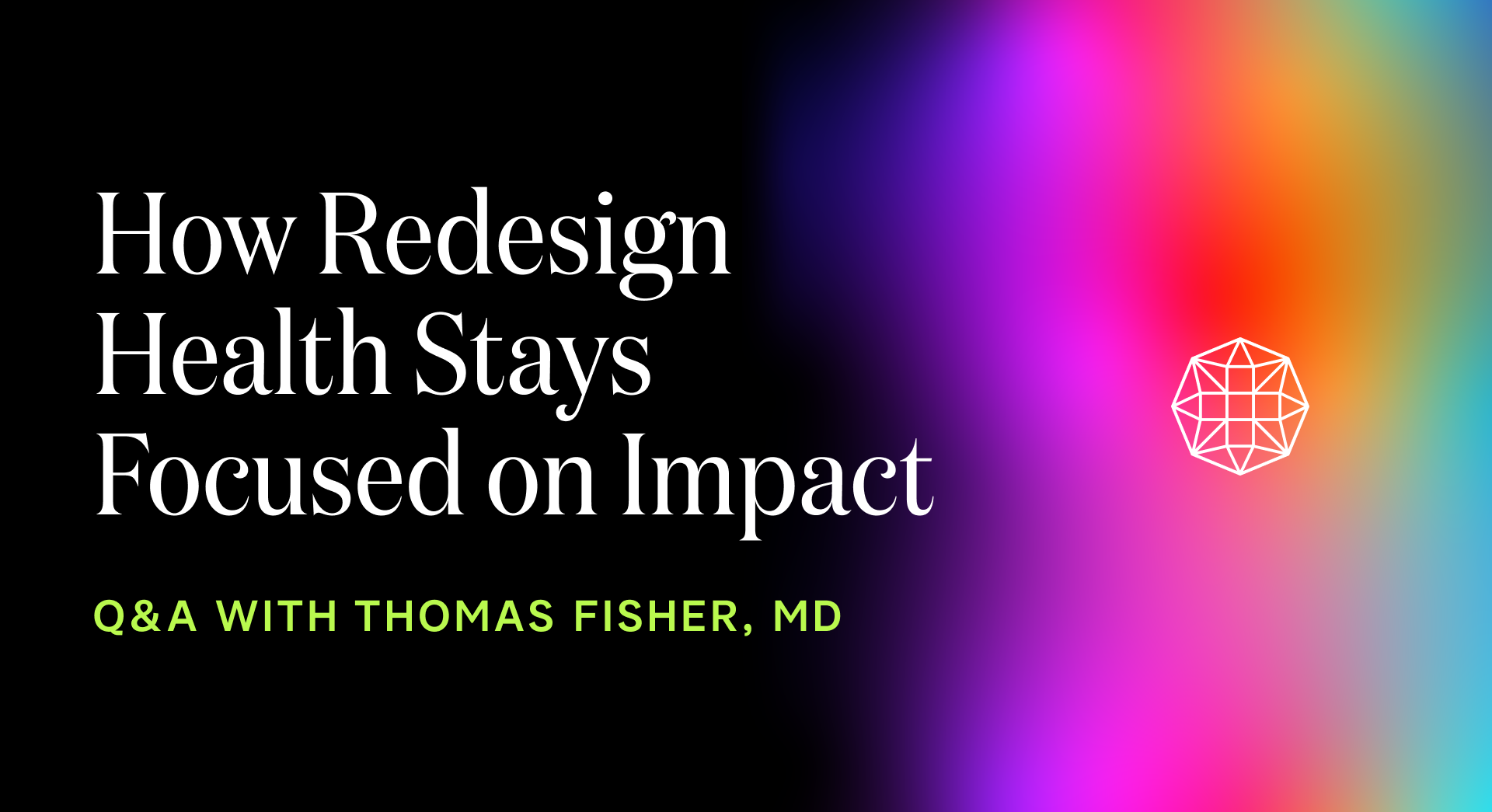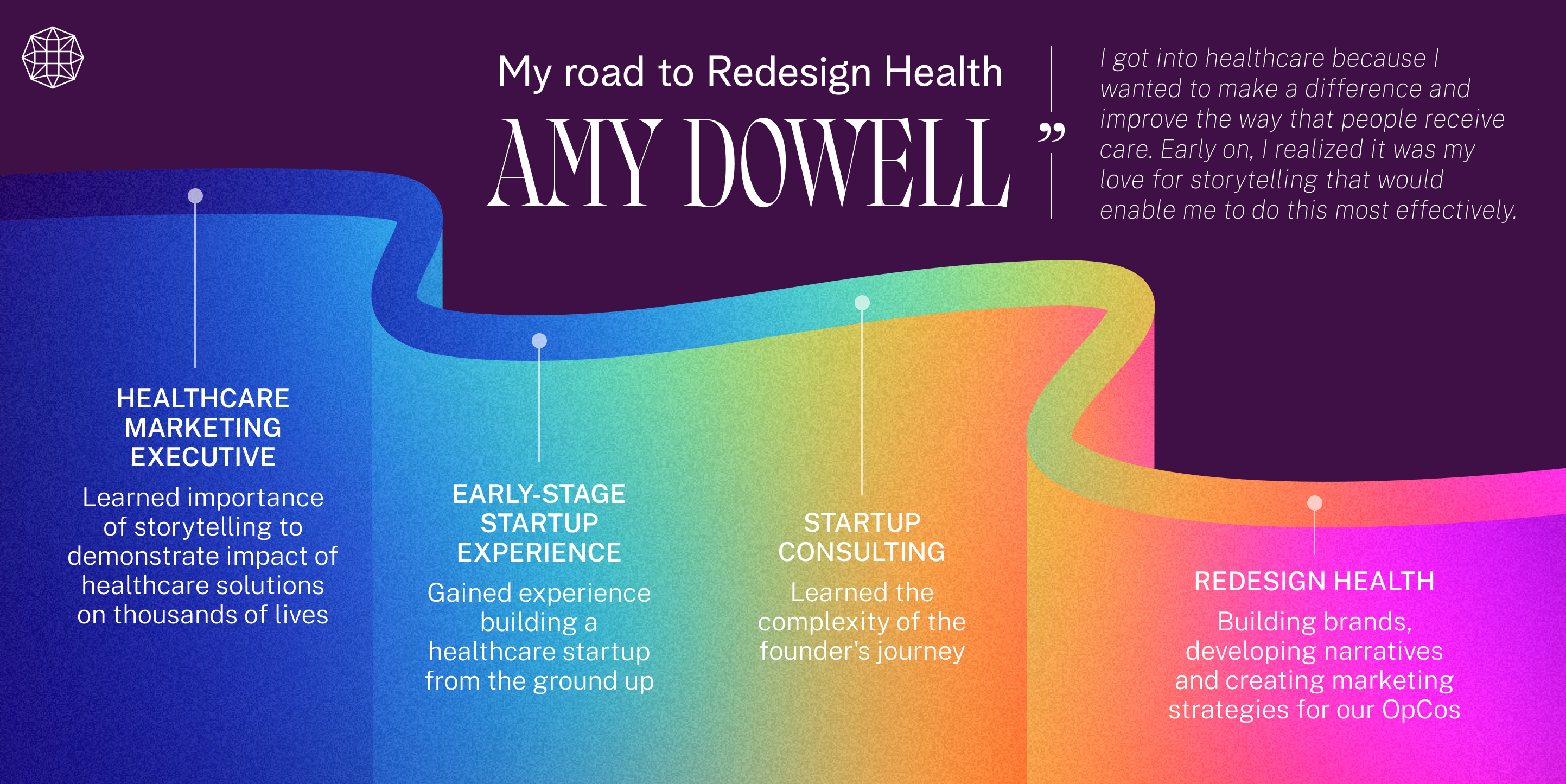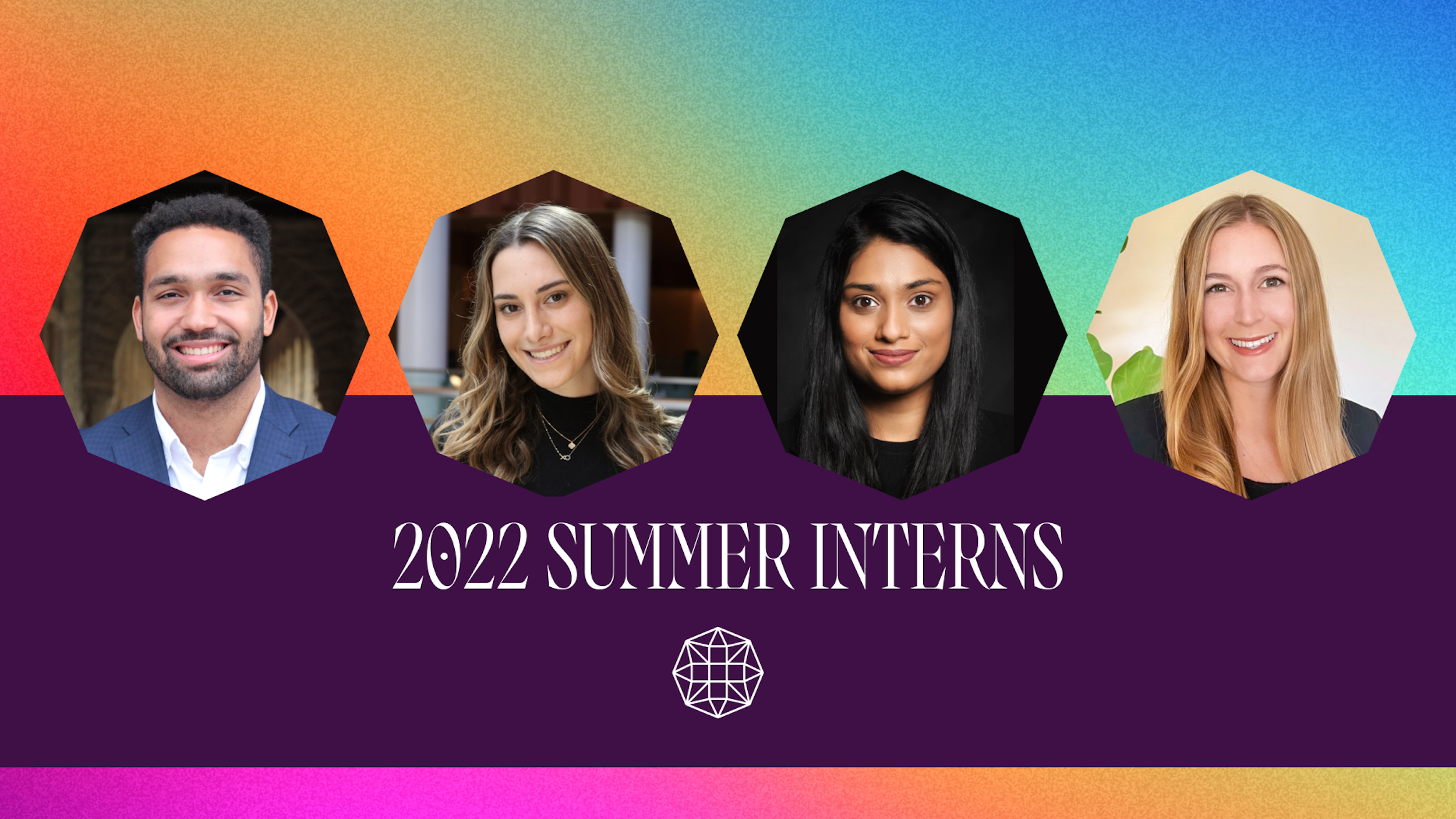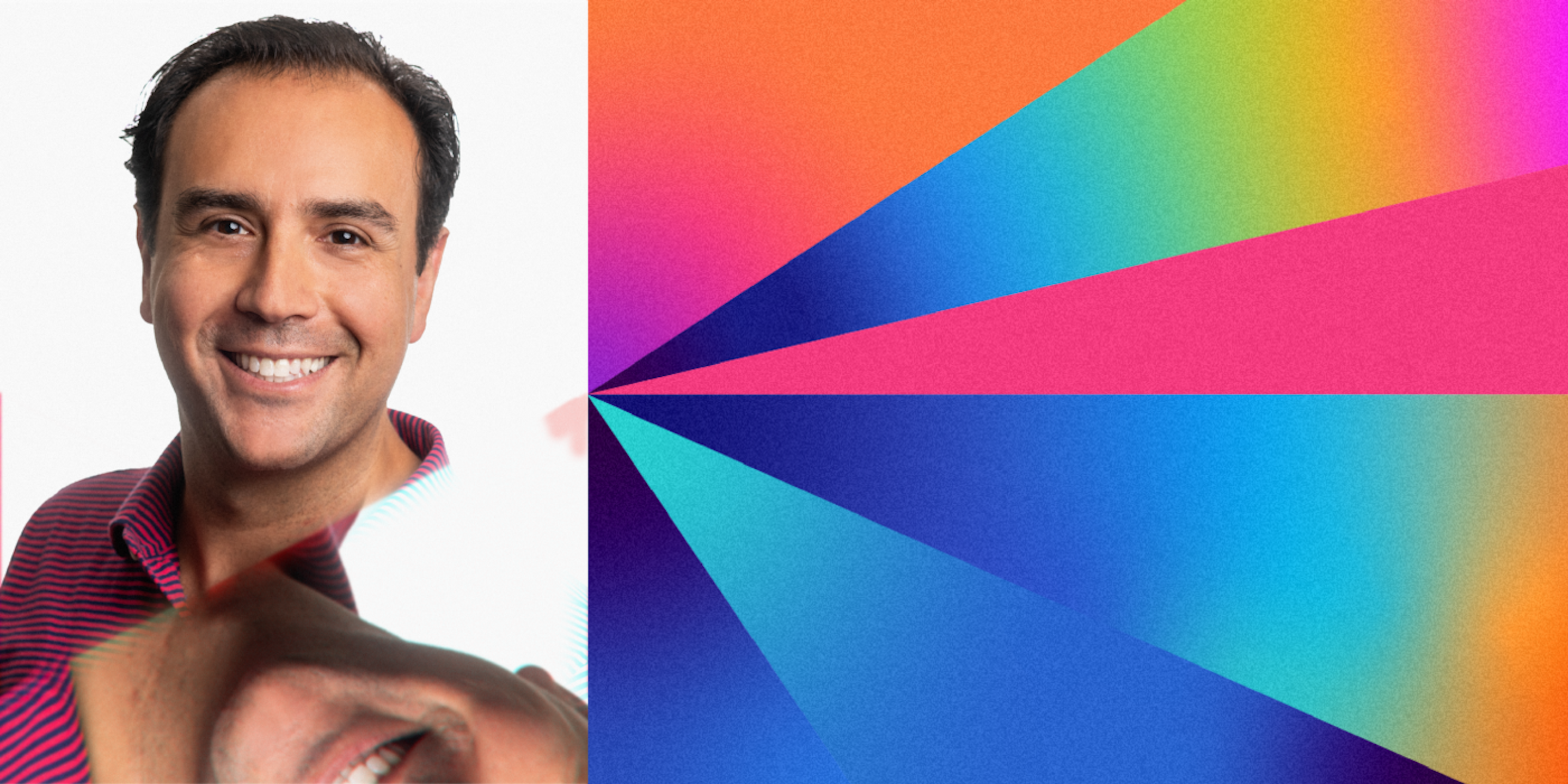
10 Questions with Kyle Talcott, CEO of UpLift
Welcome to our first post from the “10 Questions with Redesign Health CEOs” series, where we talk to CEOs of companies built at Redesign Health to learn about their experience building and scaling a healthcare business.
Aligning with Mental Health Awareness Month, our first conversation is with Kyle Talcott, Co-Founder and CEO of UpLift, a company that seeks to create more accessible, high-quality mental health care in the US by solving pain points for both patients and providers. Learn more about UpLift and other Redesign Health Operating Companies here.

UpLift’s goal is twofold. For patients: to make it easy and cost-effective to receive the professional care they need, because finding a therapist who is accepting new patients, in-network, and someone with whom a patient connects should not be impossible. And for therapists and psychiatrists who are small business owners: to make connecting with insurance providers and clients more convenient.
1. What does redesigning health mean to you?
It’s cliche to say the healthcare system is broken, but it’s also the best way to describe it. Redesigning health is an exciting challenge because healthcare is so complex, so we have to solve the actual pain points of both patients and providers. At UpLift, that means restructuring the system for providers to stay independent and continue to accept cash payments and take on clients who are in-network with payors. For patients, it’s solving the problem of finding an in-network therapist that they feel they mesh well with. As we grow, it’s essential to sustain our mission and vision; a crucial part of that is looking forward and building today what we’ll need tomorrow.
2. What role does curiosity play in innovation?
Curiosity is the key to success in building a healthcare company. A lot of people try to lean on experience. Without genuine curiosity and a desire to learn new things, I think you only know surface-level information, while the healthcare space is so deep and so expansive. If you have an appetite for learning, you can understand why something is the way it is, which is the first step in thinking about redesigning it to make more sense. And sometimes, the answer is that you can’t do that from your position within the industry.
3. What is the most crucial decision you made in the first 100 days of your company?
Well, after figuring out the business idea, there’s just only so much you can learn through interviews and talking to experts. So we decided just to start calling providers. On our second day, we ended up contracting with a provider. And at that point, we didn’t have anything else together. But once you have a provider, you can apply for a health plan contract, which is a three to four-month process. Walking through the steps helps to unblock the next steps. It was an incredible learning experience.
4. What’s the most unexpected lesson you’ve learned through your journey as a founder?
We’ve had unexpected challenges along the way. UpLift is just over a year old, so a lot has happened in such a short period. But, ultimately, this is probably one of the most straightforward builds that I’ve ever helped create. I’ve learned about the importance of the hiring process when it comes to building a successful team: we’ve hired tremendous people, and I think hiring the best people I could find is the best thing that could have happened in terms of continuing to grow the company.
5. What’s the most important feedback you’ve gotten from a patient? What role did it play in shaping your business?
At first, we had to convince prospects that we were a real company. We had a website, but it was a placeholder website. We found that if we could just reach people on the phone and relate to their real problems, they’d want to join.
When we first approached therapists and started talking about growing their practices, they would get a little defensive. So instead, we started talking about expanding access, and then therapists were more open to talking with us about the challenges of building an independent practice. When you’re first getting out there talking to people, you’ll hear no. You have to ask: why are you hearing the no’s and then continue from there.
6. What’s the key to building trust with your employees and patients?
I think we’re more hands-on with customer experience than many other companies in this space. Many providers talk about signing up for different platforms and never hear anything back. We created a culture of support for our providers to ensure they have the things they need to succeed.
We have a high satisfaction rate. Almost nine out of 10 people get to their second therapy session and stick with the platform. We’re currently interviewing a psychiatric nurse practitioner who told us that she applied to work with us full time because she had a couple of UpLift patients who were so enthusiastic about their experience with us.
7. What’s your top expectation from your team?
We have a pretty big mission, and with that comes a lot of responsibility. We commit to both building a business and delivering high-quality care. Ultimately, if we can’t build a business, then we can’t succeed in helping hundreds of thousands and eventually millions of people. That creates a healthy, motivating tension.
Doing the right thing guides our internal culture, so with that in mind, we try things in small doses and learn little by little, hopefully without making significant mistakes. We try to consider the fact that there are places to make fast decisions within healthcare, and there are places to move more slowly.
8. What’s the first thing you do when you get out of bed in the morning?
Wake up my five-year-old and get her ready to go to school.
9. What brings you the most joy?
My family and watching the Florida Gators win!
10. What’s a fact that others may not know about you?
I studied architecture in school and fell in love with the idea of becoming an architect, but I decided to explore a completely different career. Regardless, I’m still a fan of design and user experience and find it helpful to activate that part of my brain for new products and roles.
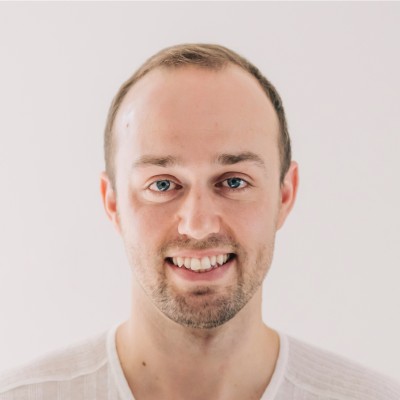
Kyle Talcott is the Co-Founder & CEO of UpLift, a company rebuilding how consumers find and access high quality mental healthcare. Kyle has spent his career building and scaling healthcare technology companies. Most recently, Kyle was the GM of Virtual Care at Cityblock Health, where he launched their virtual care business to cover more than 50,000 Medicaid members across NYC, CT and Mass. Prior to that, Kyle was an early VP at Clover Health (NASDAQ: CLOV), where he built and scaled the company’s operations. During his 5 years at Clover, he built a full time clinical and non-clinical team to over 200 people, mostly during a two year period. When he joined Clover, the company was 15 employees, with $25M in revenue, and insured 2,500 members in one state, and quickly grew to over 700 employees, with $550M in revenue, and insuring over 55,000 members across eight states, raising more than $1B in capital along the way. Before Clover, Kyle was Co-Founder, COO & CFO of Ingenios Health, a prospective risk adjustment company performing nurse practitioner home visits on the behalf of large health plans. That company was acquired in under 3 years by Almost Family (NASDAQ: LHCG). Kyle started his career as the first full time employee and Head of Finance at Audax Health, now called Rally Health, which was later acquired by Optum. Kyle holds bachelor’s and master’s degrees from the University of Florida.
People
![No alternate text]() Redesign HealthWelcoming Joseph Jasser as Our Newest Venture Chair
Redesign HealthWelcoming Joseph Jasser as Our Newest Venture ChairAccomplished healthcare executive will join the board of two Redesign Health Operating Companies
July 18, 2024
![No alternate text]() Redesign HealthIntroducing Patrick Gilligan, Our Newest Venture Chair
Redesign HealthIntroducing Patrick Gilligan, Our Newest Venture ChairA trailblazer in value-based care and digital health, Gilligan brings diverse expertise to his new role
July 12, 2024
![No alternate text]() Redesign HealthMeet Linda Nash, Our Newest Venture Chair
Redesign HealthMeet Linda Nash, Our Newest Venture ChairA pioneer in concierge medicine, Linda brings unique insights and expertise to the Redesign Health ecosystem.
May 29, 2024
![No alternate text]() ImpactRedesign HealthHow Redesign Health Stays Focused on Impact: A Q&A with Thomas Fisher, MD
ImpactRedesign HealthHow Redesign Health Stays Focused on Impact: A Q&A with Thomas Fisher, MDVenture Chair Thomas Fisher discusses how the Redesign Health impact framework guides our efforts to redesign healthcare.
July 13, 2023
![No alternate text]() TALENT ACQUISITIONBrenda Schmidt: From Healthcare CEO to Innovation Leader
TALENT ACQUISITIONBrenda Schmidt: From Healthcare CEO to Innovation LeaderBrenda Schmidt, Head of Enterprise Growth, shares how her background as an entrepreneur led to her perfect career match at Redesign Health.
May 04, 2023
![No alternate text]() PeopleAmy Dowell: Using The Power of Empathy and Storytelling, My Road to Powering Community in Healthcare
PeopleAmy Dowell: Using The Power of Empathy and Storytelling, My Road to Powering Community in HealthcareAmy Dowell, Vice President of Marketing, reflects on her career journey and how her unique experience contributes to powering community at Redesign Health.
January 26, 2023
![No alternate text]() CEOUnexpected Learnings from Healthcare Leaders
CEOUnexpected Learnings from Healthcare LeadersWe’ve asked a few leaders to share insights and lessons learned while building businesses across the healthcare ecosystem.
December 06, 2022
![No alternate text]() InnovationMissy Krasner: Aligning Incentives to Accelerate Change
InnovationMissy Krasner: Aligning Incentives to Accelerate ChangeWe recently spoke with Redesign Health Venture Chair, Missy Krasner, to share her experience building next-generation healthcare solutions at scale. The Redesign Health team is growing. Come join us!
September 22, 2022
![No alternate text]() InternshipReflections From Tomorrow’s Leaders: The Summer 2022 Class of Redesign Health Interns
InternshipReflections From Tomorrow’s Leaders: The Summer 2022 Class of Redesign Health InternsWe asked a few of this summer’s Redesign Health Interns to reflect on their experience of helping build high-quality health solutions at scale. Here’s what they had to say:
September 01, 2022
![No alternate text]() Talent AcquisitionScaling Empathy in Cancer Care with Adam Pellegrini, CEO & Co-Founder of Jasper Health
Talent AcquisitionScaling Empathy in Cancer Care with Adam Pellegrini, CEO & Co-Founder of Jasper HealthWe sat down with Adam Pellegrini, CEO & Co-Founder of Jasper Health, a digital oncology platform built at Redesign Health, which delivers personalized psychosocial support and coaching directly to members via a hybrid, patient-centric approach.
August 18, 2022
![No alternate text]() CEOLeadership Lessons from CEOs of Healthcare Companies
CEOLeadership Lessons from CEOs of Healthcare CompaniesEach Operating Company built at Redesign Health is led by a CEO who sets the vision for the company and defines the overall strategy from launch to scale.
August 03, 2022
![No alternate text]() InnovationKira Wampler: Driving Change in Healthcare Through Curiosity and Ambition
InnovationKira Wampler: Driving Change in Healthcare Through Curiosity and AmbitionWe spoke with our lead Venture Chair, Kira Wampler, to share her perspective on how Redesign Health is fundamentally changing the care equation by powering innovation at scale.
July 27, 2022
![No alternate text]() Patient ExperienceRemoving Barriers to Quality Physical Therapy Care with Kins CEO Dan Smith
Patient ExperienceRemoving Barriers to Quality Physical Therapy Care with Kins CEO Dan SmithWe welcome Dan Smith, co-founder and CEO of Kins, a company that’s modernizing physical therapy by combining the best of in-person care with the power of digital.
July 20, 2022
![No alternate text]() Talent Acquisition10 Questions with Jon Cooper, CEO of Overalls
Talent Acquisition10 Questions with Jon Cooper, CEO of OverallsAs part of our “10 Questions with Redesign Health CEOs” series, we welcome Jon Cooper, Co-Founder, and CEO of Overalls.
June 09, 2022
![No alternate text]() Talent Acquisition10 Questions with Amy Shecter, CEO of Ever/Body
Talent Acquisition10 Questions with Amy Shecter, CEO of Ever/BodyAs part of our “10 Questions with CEOs” series, we welcome Amy Shecter, CEO of Ever/Body, a company that works to demystify cosmetic dermatology and make it more accessible.
May 18, 2022
![No alternate text]() Talent Acquisition10 Questions with Kyle Talcott, CEO of UpLift
Talent Acquisition10 Questions with Kyle Talcott, CEO of UpLiftWelcome to our first post from the “10 Questions with Redesign Health CEOs” series, where we talk to CEOs of companies built at Redesign Health to learn about their experience building and scaling a healthcare business.
April 20, 2022
![No alternate text]() Talent AcquisitionTara Alvarez: My Three Favorite Things About Working at Redesign Health
Talent AcquisitionTara Alvarez: My Three Favorite Things About Working at Redesign HealthAs part of our “My Three Favorite Things About Working at Redesign Health” series, we welcome our VP of Talent Acquisition, Tara Alvarez, to share her experience cultivating Redesign Health’s team of driven innovators.
April 19, 2022



